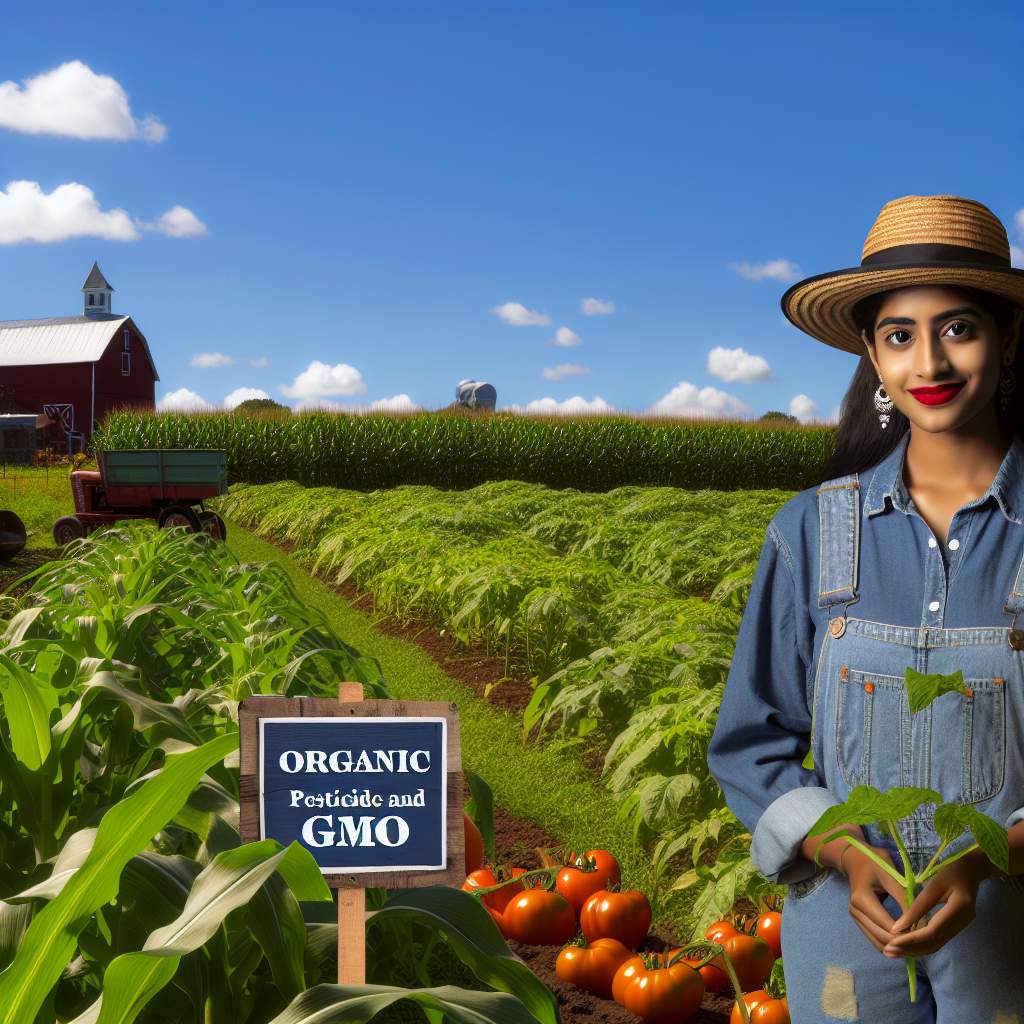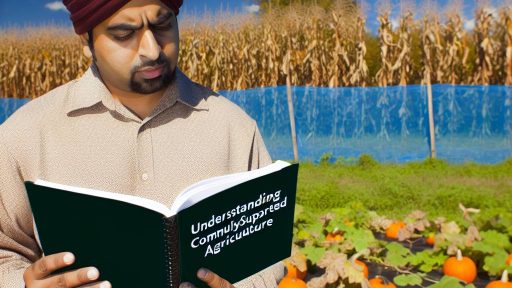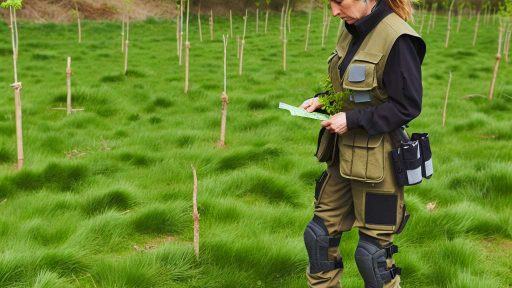Introduction to Sustainable Farming Practices
Defining Sustainable Farming
Sustainable farming focuses on producing food in a way that protects the environment.
It emphasizes practices that maintain the health of ecosystems.
This approach balances the needs of agriculture with those of natural resources.
Importance of Pesticide-Free Methods
Choosing pesticide-free methods is crucial for protecting biodiversity.
These methods reduce chemical runoff into local water sources.
As a result, they foster healthier environments for both wildlife and humans.
Non-GMO Farming Benefits
Non-GMO farming practices preserve genetic diversity among plants and animals.
These practices enhance resilience against pests and diseases.
Moreover, they reduce dependence on synthetic inputs, promoting natural growth.
CERTIFICATION: Ensuring Compliance with Standards
Certification serves as a verification of sustainable practices.
It assures consumers that farms meet established sustainability standards.
Farmers who achieve certification often see increased market demand for their products.
Transitioning to Sustainable Practices
Transitioning to sustainable practices can be challenging yet rewarding.
Farmers may need to adopt new technologies and methods.
However, the long-term benefits outweigh initial adjustments.
Transform Your Agribusiness
Unlock your farm's potential with expert advice tailored to your needs. Get actionable steps that drive real results.
Get StartedSupport from local agricultural organizations can ease this transition.
Importance of Pesticide-Free Farming
Health Benefits
Pesticide-free farming significantly reduces health risks.
It lowers exposure to harmful chemicals in food.
This approach benefits both producers and consumers.
Farmers can cultivate crops without chemical residues.
Consequently, consumers enjoy safer and healthier produce.
Environmental Impact
Pesticide-free practices promote environmental sustainability.
They help protect beneficial insects and wildlife.
Moreover, these methods improve soil health and fertility.
Healthy soil leads to better crop yields over time.
This practice reduces water pollution from agricultural runoff.
Economic Advantages
Pesticide-free farming can lead to cost savings.
Farmers save money on expensive chemical inputs.
With rising consumer demand for organic products, selling pesticide-free produce offers better market prices.
This approach can attract premium buyers and health-conscious consumers.
Sustainability and Future Generations
Pesticide-free farming ensures agricultural practices are sustainable.
It supports biodiversity and ecosystem stability.
By fostering ecological health, it safeguards food systems for future generations.
Farmers contribute to a resilient and sustainable agricultural landscape.
Overview of Non-GMO Farming Standards
Understanding Non-GMO Farming
Non-GMO farming avoids genetically modified organisms in the agricultural process.
This practice focuses on maintaining natural genetics in crop production.
Farmers utilize traditional breeding methods to develop resilient crops.
They prioritize biodiversity and soil health through sustainable practices.
Certification Process for Non-GMO Farming
Certification verifies that a farm adheres to non-GMO standards.
Showcase Your Farming Business
Publish your professional farming services profile on our blog for a one-time fee of $200 and reach a dedicated audience of farmers and agribusiness owners.
Publish Your ProfileA farmer must apply for certification through a recognized organization.
The certification process includes rigorous documentation and inspection.
Inspectors evaluate the farming methods and track seed sources.
Once approved, farmers can market their products as non-GMO.
Non-GMO Standards and Guidelines
These standards ensure that products are free from genetic modification.
They include crop selection, soil management, and pest control methods.
Farmers must also keep detailed records of their farming practices.
Regular testing of crops for GMOs is required to maintain certification.
Benefits of Non-GMO Farming
Non-GMO farming supports consumer demand for natural products.
This approach often results in healthier soils and ecosystems.
Furthermore, it helps preserve heritage seed varieties.
Many consumers feel safer purchasing non-GMO certified products.
Ultimately, non-GMO farming promotes agricultural sustainability.
Find Out More: Organic Pest Control Methods for Sustainable Farming in the USA
Steps to Obtain Sustainable Farm Certification
Understand Certification Requirements
Research the specific requirements for sustainable farm certification.
Dive deep into guidelines provided by certification bodies.
Tailor your practices to align with their standards.
Implement Sustainable Practices
Adopt sustainable farming techniques in your operations.
This includes using organic fertilizers and natural pest management.
Moreover, avoid any chemical pesticides to promote a healthier ecosystem.
Document Your Farming Practices
Maintain detailed records of all farming activities.
Include information on crop rotation, soil management, and pest control.
Regularly update your documentation to reflect current practices.
Choose a Certification Body
Select a reputable certification organization that aligns with your values.
Evaluate their process and fees before making a decision.
Once chosen, reach out to them for guidance on next steps.
Apply for Certification
Submit your application alongside your documented practices.
Ensure that all required forms are filled out accurately.
Double-check for completeness before submitting.
Prepare for Inspection
Prepare your farm for the certification inspection.
Ensure that all practices are in line with sustainable standards.
Have all documentation readily available for review.
Receive Certification
After the inspection, await the certification decision.
If granted, celebrate your achievement and commitment to sustainability.
In case of denial, review feedback and make necessary adjustments.
Maintain Certification Standards
Continue implementing sustainable practices to keep your certification.
Stay informed about any updates in certification requirements.
Regularly assess your farming methods for ongoing improvement.
Find Out More: Harnessing Waste to Generate Clean Energy on Farms
Key Organizations and Certifying Bodies
Introduction to Certification in Sustainable Farming
Sustainable farming certification promotes eco-friendly practices.
Showcase Your Farming Business
Publish your professional farming services profile on our blog for a one-time fee of $200 and reach a dedicated audience of farmers and agribusiness owners.
Publish Your ProfileIt validates farming methods that are free from pesticides and GMOs.
Various organizations oversee these certifications worldwide.
Leading Certifying Bodies
Several organizations stand out in the realm of sustainable farming certification.
They develop specific standards for pesticide-free and non-GMO farming.
Examining their criteria offers insight into sustainable agriculture.
USDA Organic
The USDA Organic label is widely recognized in the U.S.
It enforces strict guidelines against synthetic pesticides and GMOs.
Farmers must undergo annual inspections to maintain this certification.
Non-GMO Project
The Non-GMO Project focuses on transparency in food labeling.
This organization offers a certification for products without GMOs.
It helps consumers make informed choices about their food sources.
Global Organic Textile Standard (GOTS)
GOTS certifies organic textiles, emphasizing sustainability in agriculture.
It ensures that fibers come from non-GMO and pesticide-free sources.
Strict environmental and social criteria govern the entire process.
Benefits of Certification
Achieving certification provides numerous advantages for farmers.
It enhances consumer trust and brand loyalty in the marketplace.
Moreover, certified farms often qualify for higher prices.
Consumer Confidence
Certification reassures consumers about the integrity of their food.
They can be confident that their purchases support sustainable practices.
Market Opportunities
Brand recognition opens doors to new market opportunities.
Retailers increasingly prefer sourcing from certified farms.
As a result, this can lead to increased sales and profitability.
Future Directions in Sustainable Farming
As consumer awareness of sustainability grows, certification becomes crucial.
Organizations will likely expand their standards and outreach.
Farmers who adopt these practices stand to benefit significantly.
Find Out More: How Precision Agriculture Enhances Crop Yield and Farm Profitability

Benefits of Certification for Farmers
Increased Market Access
Farmers gain access to new markets through certification.
This process allows them to reach consumers who prefer sustainable products.
Moreover, many retailers prioritize certified products.
As a result, certified farms attract more business opportunities.
Enhanced Consumer Trust
Certification builds trust among consumers.
It assures them that the products are safe and environmentally friendly.
Consequently, consumers are willing to pay premium prices for certified goods.
This trust can lead to strong customer loyalty over time.
Improved Farming Practices
Certification encourages farmers to adopt better practices.
These practices often lead to higher yields and reduced costs.
Farmers also receive training on sustainable farming techniques.
This knowledge can result in healthier crops and soils.
Environmental Benefits
Certification promotes environmental sustainability.
Farmers engage in practices that preserve biodiversity.
Showcase Your Farming Business
Publish your professional farming services profile on our blog for a one-time fee of $200 and reach a dedicated audience of farmers and agribusiness owners.
Publish Your ProfileThey also help protect natural resources such as water and soil.
These practices reduce the farm’s ecological footprint significantly.
Financial Incentives
Certified farmers often benefit from financial incentives.
These may include grants, subsidies, or lower-interest loans.
Incentives can help offset the costs of transitioning to sustainable methods.
Additionally, certified products can command higher market prices.
Community Support
Certification can foster a sense of community among farmers.
It connects them with like-minded individuals who share similar goals.
Farmers can collaborate on best practices and share resources.
This support network can boost morale and provide motivation.
Explore Further: Water Management Strategies in Agroforestry for US Farmers
Market Demand for Certified Pesticide-Free and Non-GMO Products
Growing Consumer Awareness
Today’s consumers increasingly seek transparency in food sourcing.
They favor products labeled as pesticide-free and non-GMO.
This shift stems from heightened awareness of health concerns.
Moreover, consumers desire to support sustainable farming practices.
As a result, demand for certified products continues to rise.
Impact of Health Trends
Health trends significantly influence consumer choices.
Many individuals now prioritize organic and natural foods.
They associate these foods with better health outcomes.
This mindfulness drives the market for pesticide-free options.
Environmental Concerns
Environmental sustainability plays a crucial role in consumer demand.
People are increasingly aware of pesticides’ negative environmental effects.
This awareness has led to preferences for eco-friendly farming.
Consumers prefer products that minimize ecological impacts.
Retail and Market Response
Retailers are responding to changing customer preferences.
Many stores now offer a wider range of certified products.
They feature organic and non-GMO items prominently.
This strategy helps attract health-conscious consumers.
Implications of Market Trends
The shift toward certified pesticide-free and non-GMO products reflects broader trends.
Growing health consciousness and sustainability awareness drive this demand.
As consumers continue to prioritize these values, the market will likely expand further.
Challenges in Achieving Certification and Solutions
Understanding the Certification Process
Farmers often face confusion regarding certification requirements.
The complexity of guidelines can be overwhelming.
Different certifying bodies impose varying criteria.
Communication and transparency from organizations remain crucial.
Before applying, farmers should thoroughly review certification standards.
Financial Barriers
Cost remains a significant barrier for many farmers seeking certification.
Initial investments for transitioning to pesticide-free and non-GMO practices can be high.
Additionally, ongoing costs for compliance can create financial strain.
However, cooperative programs can alleviate some of these burdens.
Showcase Your Farming Business
Publish your professional farming services profile on our blog for a one-time fee of $200 and reach a dedicated audience of farmers and agribusiness owners.
Publish Your ProfileFarmers might consider joining local farming networks for shared resources.
Knowledge Gap
Achieving certification often requires specialized knowledge.
Many farmers lack access to training on organic practices.
This gap can deter farmers from pursuing certification.
Workshops and educational programs can bridge this knowledge divide.
Partnerships with agricultural universities can provide valuable insights.
Market Competition
Selling certified products can be challenging in a competitive market.
Farmers need effective marketing strategies to distinguish their products.
Building a loyal customer base often takes time and effort.
Networking at local farmers’ markets can enhance visibility.
Collaboration with other certified farms can help in promoting sustainable practices.
Staying Updated with Regulations
Regulations regarding sustainable farming often change.
Farmers must stay informed about evolving standards.
Neglecting updates can risk certification status.
Subscribing to agricultural newsletters is an effective strategy.
Engaging with local agricultural extension services also proves beneficial.
Strategies for Overcoming Challenges
Farmers can adopt several strategies to overcome certification challenges.
Building networks with other farmers fosters a supportive community.
Engaging in continued education helps maintain compliance.
Utilizing online resources can provide easy access to information.
Moreover, seeking financial assistance through grants can alleviate costs.
Ultimately, persistence and resourcefulness pave the way to successful certification.
Additional Resources
Organic Farming – lindsaymcnamara.com
Organic, Locally Grown, Pesticide Free, Grown Naturally…. What …




